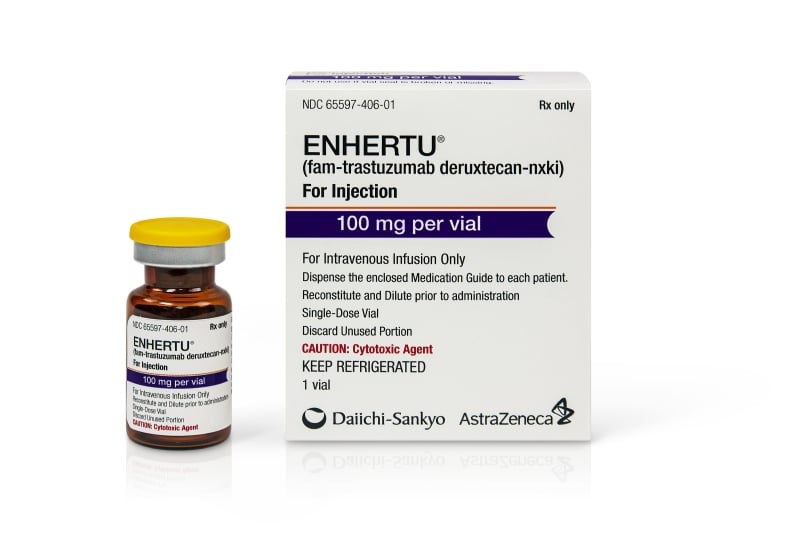Greetings, BioPharmaPulse Enthusiasts!
In this ever-evolving world of biopharmaceutical innovation, every day brings new breakthroughs that push the boundaries of what's possible. I'm thrilled to guide you through the latest developments shaping our industry.
What's in this issue:
- 🧬 Discover how CRISPR Therapeutics is revolutionizing cholesterol management with in vivo liver editing.
- 👁️ Learn about Beacon's promising gene therapy showing vision improvements in rare eye diseases.
- 💪 Uncover the success of Enhertu in another breast cancer trial by AstraZeneca and Daiichi Sankyo.
- 🔎 Dive into the future of personalized medicine and its impact on patient care.
Quote of the Day
"The science of today is the technology of tomorrow." – Edward Teller
Latest Developments
🧬 CRISPR Therapeutics sees 80% fall in LDL, triglycerides after in vivo liver editing (1 minute read)

Rundown: CRISPR Therapeutics has reported groundbreaking results from their in vivo liver editing candidate, CTX310. After a single dose, patients experienced reductions in triglycerides and LDL cholesterol of more than 80%. This significant decrease showcases the potential of gene editing therapies in managing cardiovascular diseases.
Key Points:
- 🧪 CTX310 Demonstrated Efficacy: A single dose led to over 80% reduction in LDL cholesterol and triglycerides.
- 🔬 Gene Editing Success: The therapy targets genes in the liver responsible for lipid production.
- 🌐 Potential for Broad Impact: Could revolutionize treatment for cardiovascular conditions linked to high cholesterol.
- 🚀 Advances in In Vivo Editing: Marks a significant milestone in gene therapy applications.
Why it matters: Cardiovascular diseases remain a leading cause of mortality globally. This advancement not only demonstrates the power of CRISPR technology but also opens doors to more effective, long-term solutions for managing cholesterol and related health risks.
👁️ Beacon's rare eye disease gene therapy signals vision function improvements in early phase 2 data (1 minute read)

Rundown: Beacon Therapeutics has released promising interim results from their phase 2 trial for a gene therapy targeting X-linked retinitis pigmentosa. Patients demonstrated improved visual function at the six-month mark, offering hope for those affected by this rare degenerative eye disease.
Key Points:
- 👁️ Visual Improvements Noted: Patients showed enhanced vision function after treatment.
- 🧬 Gene Therapy Approach: The therapy delivers a functional gene to retinal cells.
- 🗓️ Six-Month Interim Analysis: Positive results at this early stage are encouraging.
- 🌟 Hope for Rare Diseases: Addresses a significant unmet medical need.
Why it matters: X-linked retinitis pigmentosa can lead to severe vision loss. Beacon's gene therapy represents a potential life-changing treatment for patients with limited options, highlighting the transformative potential of gene therapies in combating inherited diseases.
💪 AstraZeneca, Daiichi Sankyo's Enhertu rings up success in another breast cancer trial (1 minute read)

Rundown: Enhertu, a collaboration between AstraZeneca and Daiichi Sankyo, has achieved positive results in a phase 3 trial for early breast cancer. This success follows recent positive outcomes in first-line breast cancer trials, further establishing Enhertu's efficacy.
Key Points:
- 🩺 Phase 3 Trial Success: Enhertu shows significant benefits in early breast cancer treatment.
- 💊 Targeted Therapy: Enhertu is designed to deliver chemotherapy directly to cancer cells.
- 📈 Consistent Efficacy: Recent trials reinforce its potential as a frontline treatment.
- 🌍 Global Impact: Could improve outcomes for millions of breast cancer patients worldwide.
Why it matters: Breast cancer remains one of the most common cancers among women. The success of Enhertu in early-stage disease could lead to improved survival rates and quality of life for patients, marking a substantial advancement in oncology therapeutics.
Question of the Day
🤔 How do you think gene editing will impact the future of disease management?
Trending
🏭 Gilead reveals plans to put another $11B into US manufacturing
- Gilead is investing $11 billion to expand its U.S. manufacturing and R&D operations. This significant investment underscores the company's commitment to advancing drug development and strengthening the biopharmaceutical infrastructure.
Industry Insight
🔎 The Rise of Personalized Medicine
Personalized medicine is transforming the approach to patient care. By considering individual genetic profiles, lifestyle, and environment, therapies can be tailored to achieve the best outcomes.
Embracing personalized medicine allows for:
- 🎯 Targeted Treatments: Therapies designed specifically for individual patients.
- ⏱️ Improved Efficiency: Quicker responses and reduced trial-and-error in finding effective treatments.
- 💊 Reduced Side Effects: Minimizing adverse reactions by avoiding unsuitable medications.
By focusing on the individual, we move towards more effective and patient-centric healthcare solutions, paving the way for a new era in medicine.
Quick Hits
🚨 C4 Therapeutics halts BRAF degrader work to save cash for cemsidomide (1 minute read)
- C4 Therapeutics is discontinuing its BRAF degrader program to focus resources on their IKZF1/3 degrader, cemsidomide, highlighting strategic prioritization in drug development.
🔄 Neurocrine hands back 2 CNS gene therapy programs to Voyager (1 minute read)
- Neurocrine Biosciences returns two gene therapy programs to Voyager Therapeutics, though their broader CNS collaboration continues, indicating shifting focuses in partnerships.
📉 Novo's Wegovy takes a hit from compounders, but company expects faster second-half growth (1 minute read)
- Novo Nordisk reports a dip in sales of Wegovy due to competition from compounding pharmacies but anticipates accelerated growth later in the year.
⚖️ FDA will convene vaccine advisors to discuss Covid strain updates (1 minute read)
- The FDA plans a meeting to discuss updates to COVID-19 vaccines, aiming to address emerging variants and prepare for future public health needs.
💡 Cancer innovation in ‘era of fear’: New AI tools meet old access barriers — and new funding cuts (1 minute read)
- Advances in AI are driving cancer innovation, but challenges in access and recent funding cuts present obstacles that need addressing to maximize benefits.
Wrap Up
Thank you for joining me on this journey through the latest in biopharmaceutical innovation. The strides we're seeing in gene therapy, personalized medicine, and targeted treatments are truly inspiring and hold immense promise for the future of healthcare. Let's continue to stay informed and support the advancements that bring hope to patients worldwide.
Warm regards,
Elliot Reeves | BioPharmaPulse
😊 How did you like today's email?
- 😍 Loved it
- 🙂 It was OK
- 😕 Could be better
